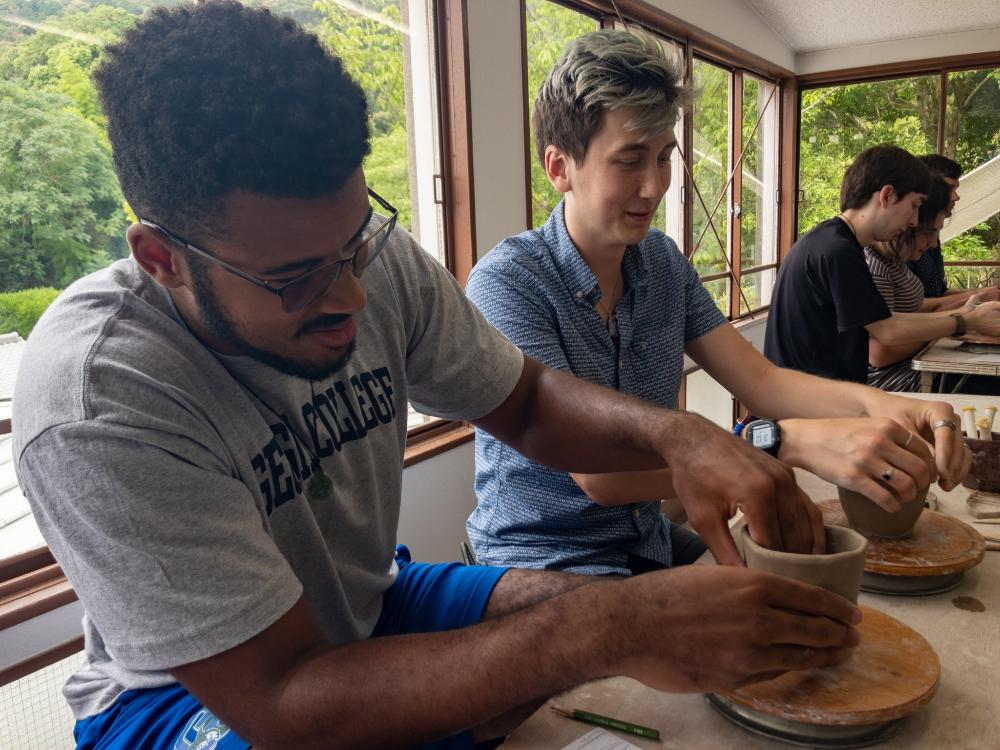Racial & Ethnic Diversity Abroad
Studying Abroad as a Person of Color
Things to Consider
Things to Consider
When thinking about studying abroad, it can be a nerve-wracking and slightly intimidating experience for the best of us. However, that experience becomes even more intimidating when you’re unaware of how your host country or community will react to your ethnicity or race. Here are a few key things to keep in mind before studying abroad:
- Consider which countries have histories that are full of racial tensions, and with which races those conflicts were involved. Look at the map below from The Washington Post to see which countries are more welcoming to foreign visitors. Think about if you’d want to be in a country where people are more likely to make hateful comments or slurs towards you.
- The United States is one of the most culturally diverse countries in the world. Because of this, most other countries do not have or see the level of diversity that we do on a daily basis. That means that a lot of people might have never seen a person of a specific race, or might not know if some behaviors are seen as inappropriate. For example, in some countries, locals may comment or try to touch your hair or skin if it looks different from theirs. Try to determine if someone’s curiosity is genuine or if they have bad intentions. If they are genuinely curious and don’t know any better, try to act in the best way you see fit.
- Political Correctness is not as common abroad. It is likely even if it is more of a diverse or racially tolerant country, that people will not use the most “politically correct terms” towards you. They might even say things that we consider offensive, even if they are not trying to be.
How do I get started?
When you start thinking about studying abroad, here are some basic steps to follow in how to select your program, apply for it, and prepare for your country of choice.
- Visit the Cultural Center on campus
Head on over to the Cultural Center (Blackbridge Hall, 111 S. Clarke Street) or the Office of Inclusive Excellence (108 Parks Hall) and talk to some of our friendly and informed staff! These staff members have been trained in all cultural issues, and will be able to give some insights on which countries are better than others, as well as strategies to handle hostility while abroad.
- Talk to Study Abroad Advisor
Come to the International Education Center at the Bone House and talk to one of our expert Study Abroad Advisors! Our Study Abroad Advisors can give you all kinds of advice on which programs would be best for you and your major, as well as what countries are more friendly towards different races & ethnicities.
- Narrow down location options
Do some research on countries you’re interested in traveling to, and see what their general attitudes are towards people of color.
- Search for the right program
Pick a program that fits you & your major, as well as one that’s in a country where you feel comfortable!
- Research scholarship opportunities
There are lots of scholarships out there that can help you finance your trip, especially for students of color! Fund for Education Abroad has many scholarships to check out. Georgia College even has its own New Horizons Scholarship that is specifically for students of color, LGBTQ+ students, students with disabilities and students of different socioeconomic backgrounds.
- Read up on location of interest
Do some more research in preparation, and see if you can find any people of color who have been there before and find out what they felt about their experience!
- Apply & finalize trip
- Talk to the Program Director
The program director will likely know some more nuanced details about the specific areas you will travel in. They can also let you know if there are any other students of color also going on the program.
- Arrive and adjust
Remember that it takes any person time to adjust to a new adventure. Be patient with yourself and with others. Be sure to communicate quickly with your program director or coordinator or your GC study abroad advisor if you have any concerns while abroad.
Study Abroad Tips
There are a few different ways you can prepare for your study abroad program, and to know what kind of reception you can expect from locals when you get there.

- Are there any other students of color on GC’s campus who studied abroad in the past or are currently abroad that you could talk to? If so, find out how comfortable they felt in their host country, how they were received by the locals there, and how they reacted if people were hateful towards them.
- What are some strategies you can use if someone does react with hostility towards you based on your skin color? Talk to one of the workers at the Cultural Center/ HUB and try to think of some strategies ahead of time you could use if the situation presents itself.
- Research, research, RESEARCH! Take time to research the country or town you will be staying in. See if there is a history of any racial tensions or stereotypes prevalent in your host country that you should be aware of before you go abroad. Also, see what the local cultural norms/ attitudes are towards someone of color so you can be prepared before you leave.
- Finally, if you’re staying with a host family, try to find out if they’ve ever housed minority students before and how that situation went. Discuss with those students if they ever had any issues with a host family, and strategies they used to make things easier with them.
Visit Diversity Abroad which has a huge collection of articles and helpful info, including the..
